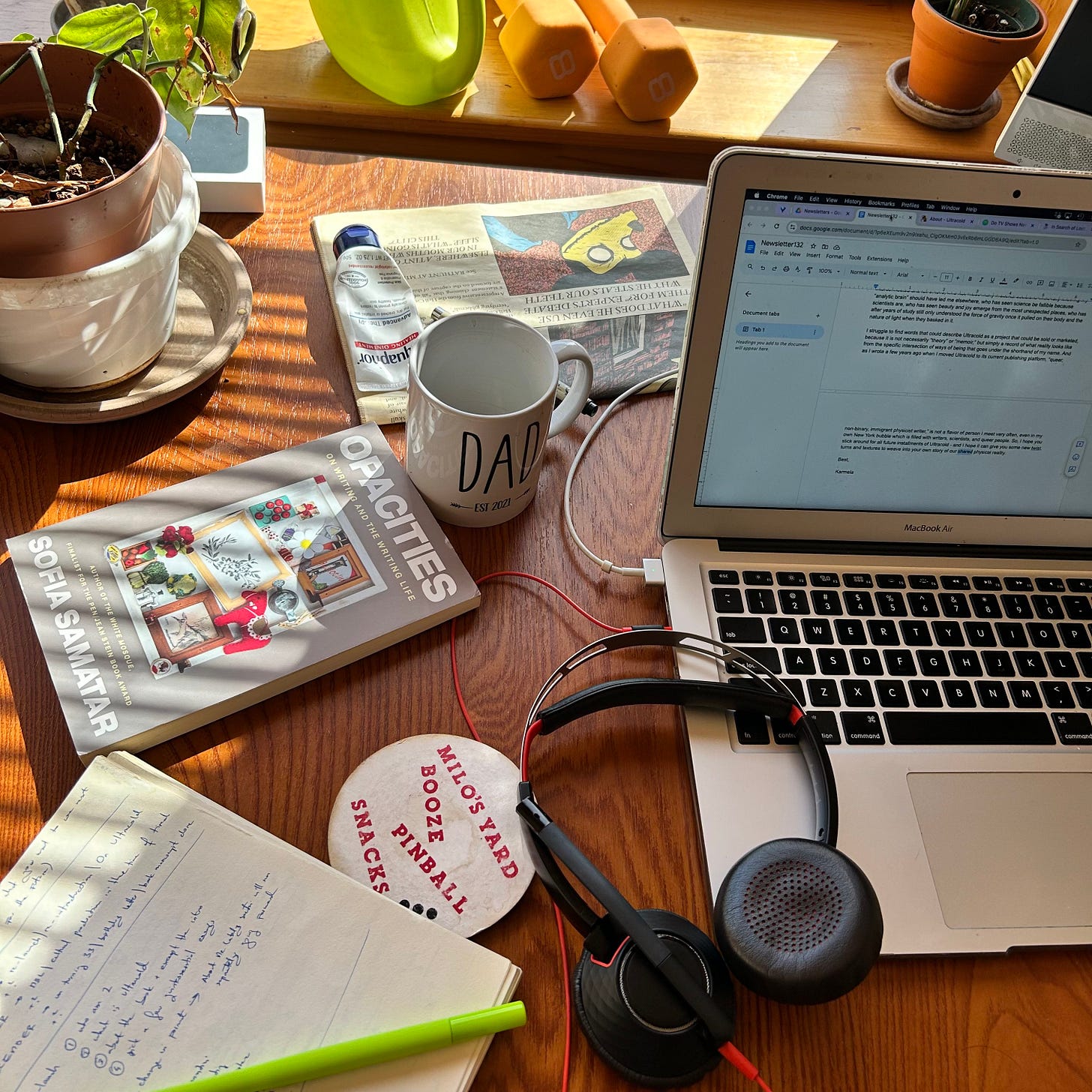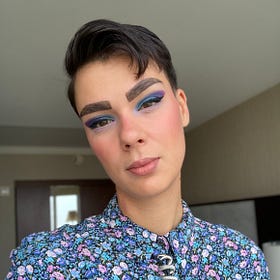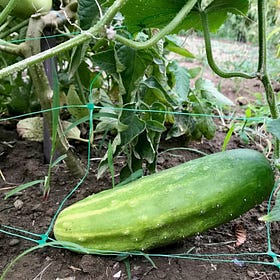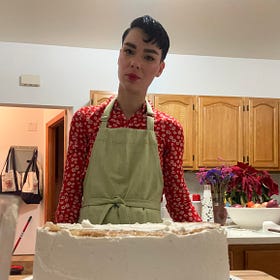Ultracold
A newsletter reintroduction
Thanks for reading my newsletter! All opinions expressed here are strictly my own. Find me on X, Instagram and TikTok. I’d also love it if you shared this letter with a friend.
ULTRACOLD
In July of 2017, I wrote an essay about a visit to a bioenergy healer that my mom had orchestrated while I was visiting home years prior and sent it to a dozen or so friends and acquaintances through TinyLetter. This was the first issue of Ultracold, 131 letters and more than 7 years ago. Almost everything about me and my life has changed since, but this project kept going. Consider this a formal reintroduction.
When I wrote that first essay, I was living in Urbana, Illinois and finishing the third year of a Ph.D. in theoretical physics, holding my third consecutive student visa and feeling somewhat at home in the American Midwest. I was in a committed relationship with a man who I had met in Illinois, but who had since followed his research advisor to a different university, a place on the East Coast that was very prestigious and very far away from me. I knew I was queer, but had not grown into the word “nonbinary” yet and most of my identity was shaped by the notion that I was a physicist.
I had wanted to be a physicist since the 7th grade. I moved to the United States from Croatia by myself at 16 to attend better schools so I could then become a better physicist. I attended a really demanding college because of the reputation of its physics program and graduate school was the last leg of a decades-long dream. The name of this project betrays this - the focus of my Ph. D. was studying atoms almost as cold as the ultimate temperature limit that we call absolute zero. But “ultracold” was meant to have two other meanings too.
First was a reference to the frigid Illinois winters that always remained foreign to me, largely because I spent my childhood soaking up the sun on an island in the Adriatic. The second was more personal, both a jab at and a reclamation of the fact that I had always been told that I am if not unfriendly then at least seemingly very cold. So, Ultracold was never a science communication project and it had never not been personal. Over the years, I developed my voice, my tools for making sense of the world, and a stronger sense of self, by exploring the intersection of the scientific and the personal through writing Ultracold.
Today, I am a news reporter at New Scientist where I write about physics, materials science, quantum technology and chemistry. I married that man and we moved to New York City where we still live. My first book, Entangled States: A Life According to Physics, forthcoming from Beacon Press in 2025, is one chapter short of being done, and if you were to look me up you would find out that I am a nonbinary science writer before you would find the nearly dozen peer-reviewed papers I had produced as a scientist. In 2107, I started writing because I needed, as I wrote, “an exercise in honesty, an excuse for self-examination, and an incentive to keep in touch,” but today writing is one of the biggest forces that drive my life.
Though this shift, from physics to writing, may seem abrupt and unexpected, that impression is largely a function of how I have chosen to tell my story. There is an alternative version. Here, I start by telling you that I was a writer as a child, that my mom bound blank booklets for me to write in, that I won reading awards at my local library, that I wanted to be the next Agatha Christie, then, later, the next William Gibson, that I went to journalism summer camp in middle school, had short stories published in Croatian anthologies in high school, and started then abandoned several blogs in college.
Having spent most of my adult life in academia has dissuaded me from telling this story because it was ultimately my interest in science that led to institutional recognition, my moving across the world, and several degrees. The capitalist world that I have always lived in also seems to abhor a generalist, in part because intersectional, system-level knowledge is a danger to it, in part because it is more easy to monetize and exploit specialization. What I’m saying is, when I got the message that not only do you have to be exceptional and rebellious to be, and do, several things at once, but also that that mode of work is hard to live off, I almost always listened. In that sense, Ultracold has been my small but consistent rebellion, a space where I could not just take myself seriously as both a physicist and a writer, but also whoever else I wanted, whether that be a vegan baker or an avid consumer of Star Wars cartoons and a boxing class aficionado.
But the biggest thing that I learned from writing Ultracold, and the thing that has kept it going even through some of the most difficult and tumultuous periods of my life, is that my seemingly battling desires to be a scientist and to be a writer actually always had the same origin. Both are fundamentally about making meaning of the world, and about telling its story. Science may use the highly codified language of mathematics and you may have to turn to rigid institutions to be trained in the rules and practices of this language, but at its heart it’s all just another mode of storytelling. I feel extremely lucky to have had a chance to learn the ins and outs of this type of engagement with our physical reality, but have also long recognized that its bid for being deemed the only correct game in town, and its claims for being such because the subjective, human influences are presumably removed from it, can and do fall short.
In my essays for Ultracold, I am inevitably writing as someone who has been trained to analyze the world in the tradition of Western science, to chunk it up, disassemble it and focus on its rote mechanics. But I am also writing as someone who has experienced that world as interconnected and full of love, who has made many irrational decisions while fully knowing my “analytic brain” should have led me elsewhere, who has seen science be fallible because scientists are, who has seen beauty and joy emerge from the most unexpected places, who has after years of study still only understood the force of gravity once it pulled on their body and the nature of light when they basked in it.
I struggle to find words that could describe Ultracold as a project that could be sold or marketed, because it is not necessarily “theory” or “memoir,” but simply a record of what reality looks like from the specific intersection of ways of being that goes under the shorthand of my name. And, as I wrote a few years ago when I moved Ultracold to its current publishing platform, “queer, non-binary, immigrant physicist writer,” is not a flavor of person I meet very often, even in my New York bubble which is filled with writers, scientists, and queer people. So, I hope you stick around for all future installments of Ultracold for more of this perspective - and I hope it can give you some new twists, turns and textures to weave into your own story of our shared physical reality.
Ultracold publishes monthly, on the last Monday of each month. It has always included a longform essay followed by a links-and-recommendations section titled “About Me Lately,” but going forward I will be sending that latter part, a sort of media diet and actual diet roundup, separately, mid-month. The essays will continue to publish on the last Monday schedule. All content will remain free, but if you would like to support me financially, you can also become a paid subscriber.
Below, I’ve rounded up some recent essays that fall under themes that I tend to return to the most (science, food, identity, writing) as well as a few of the “love letters” that I write every February. It would mean a great deal to me if you shared this newsletter with a friend or posted about it on social media.
Thank you for being a reader,
Karmela
P. S. I was partly inspired to finally write a letter like this after I attended Alicia Kennedy’s Newsletter Workshop, which I would very much recommend.
Help me grow this newsletter by recommending it to a friend, sharing this letter on social media or becoming a subscriber.
LETTERS ABOUT SCIENCE AND SOCIETY
Wigner's Friend
"Researchers have written myriad papers and books about what it means for our reality that something like a wavicle can exist at all (one popular theory is that it doesn’t and we have just failed to construct experiments sufficiently good to reveal to us its “true” and more definitive nature). Often, I think that organizers and activists leapfrogged them by understanding that we can not just intellectualize but also experience some of the wavicle’s meaning if we stop pretending that the lessons of science exist without a societal context."
Chimera Patterns
"As is often the case, to oppose oppression and totalitarian thinking, we need to invest in nuanced, complex views, and also a good amount of self-reflection and discomfort. That sort of investment is in stark contrast with values that whiteness, malesness and colonialism imbued in science over the decades. This is a potent reminder that all work of building a better world is related, and that using science for good requires making science itself better by not taking its mores and methods as being beyond criticism."
Femtosecond
"Maybe we all just like temporary drama and the feeling of something new, some new win, and cannot relate to ourselves in the future who may be affected in some less sexy way, just trying to make it through the thing of their day like many of us are currently trying to push through our own right now."
LETTERS ABOUT FOOD AND VEGANISM
Closed Timelike Curve
"You know those time travel paradoxes where you go back in time and kill your grandfather? In my version I don’t hurt the man, I just become him as he is salting olives, laying fresh figs out to dry on the veranda, or picking slightly overripe cucumbers in his garden. I don’t tempt the universe to annihilate my future and present self, but go through the motions of how he cares for his family by putting food on the table just like his parents did, and try to encode them into my muscles so I would be able to do the same. I don’t want to travel backwards in time to change things, I just want to make sure that the connection with the land and the gratitude for its gifts that is quickly slipping away from my big city life becomes reinforced in my core before it’s too late. "
Measurement Driven Engine
"The cake then, the date cake with peanut butter frosting and chocolate glaze, is a way for me to put my hands to work, and to reach across time to the version of me who wanted to be just like those women. You’re good enough, crumbles the deep brown cake beneath my teeth. You were always good enough, the peanut butter coats the tines of my fork. It’s safe to feel good now, the imperfect glaze melts on my tongue."
Vicsek Model
"Most of my memories of visiting the cabin in the woods include my late grandfather. He was both a gentle and an angry man, something like an economist in his professional life, or so I imagine because he never talked about it enough to make me think knowing the details of his profession mattered for understanding him, and a singer, a hunter and a nature lover in the part of his life that I got to participate in the most. He had mostly stopped hunting by the time I was old enough to form memories, but he would still sometimes buy hunting magazines and his old hunting club would send him calendars featuring gorgeous animals that one could potentially hunt. He loved to cut out the animals and paste them into little notebooks for me to draw around and write their names in shaky cursive. "
LETTERS ABOUT IDENTITY
The Leidenfrost Effect
"It seems unavoidable to sometimes find yourself living the kind of life that reads as a cliche. Like spending a Saturday afternoon dancing in the rain at a courtyard party in Brooklyn. Or tearing up at a stadium show where the whole crowd sings every word as if it had been written strictly about them. Or taking a Valentine's Day staycation in a hotel room that is mostly a bathtub with a nice view of a storied city. Or drawing a big heart on your partner’s lunchbox and texting them “I love you” once you know they’ve settled at their desk."
Macroscopicity
I’ve grown both bored and annoyed with the idea that I have to be a better adult than my parents, and that I should learn from their mistakes in order to do the same but better. And though no-one really taught me, or showed me, that this is allowed, I’ve found myself living in a state that masquerades as adulthood in number only. Really, for the last few years, I have been trying to squint and see what could exist beyond the pre-prescribed steps, perching on the edge of one or the other with no real desire to fly away."
Single Photon Interference
"The electron that can jam itself through two narrow passageways at once then meet itself in the middle is not so much aspirational as much as I, at times, feel a kinship with it. For one version of me, and all version of me are somehow inhabiting a mix of many ways of being at once, slit 1 requires me to wiggle my way through the box of either wife (green card worthy) or exceptional talent or scholar (visa worthy), and slit 2 narrows my identity down to who I was at 16 (small, confused, sad) when I left home or, even more intimidatingly, who my parents think I should be at 30 (mental healthy, childbearing, womanly). "
LETTERS ABOUT WRITING
Phase Imprinting
"I don’t believe in hierarchies and gate-keeping and I am by default suspicious of any body that claims to have authority over who a person can be, but the metrics we have for expertise right now rely on such bodies and institutions, and that’s a part of my daily experience. How much I think my voice matters is tied to how much I think I matter and that is, in turn, influenced by the places, contexts and social structures I move through. When I feel I need to learn more to count as a “real” writer, the other side of the coin is unlearning some of what the world I live in has loaded onto that adjective."
Multi-layer Graphene
"Most people I interview as a journalist are professors. Most don’t look like me, but if we stay on a call long enough, we start to sound similarly. Once, a nuclear physicist who helped me a ton with a complicated story about particles that hide inside of particles that hide inside of atomic nuclei asked me whether I had ever considered a career in physics because he liked my questions. He was disappointed when I said that I was trained to be one, just never quite made it."
FEBRUARY IS FOR LOVE LETTERS
Quantum Entanglement
Quantum entanglement is a metaphor for love that is so obvious that a writer should almost certainly avoid it. The idea of two inextricably connected bodies, a connection that survives even across a large distance, neatly invokes the idea of entanglement if you’re a physicist. Equally neatly, it invokes the idea of a secure, steady relationship if you happen to be in love, or yearning for it. Because it is so neat, the chances of overlooking some subtlety when drawing the analogy between the two seem sky high. But I have been trained to see the world through the eyes of a physicist, and for the past decade I have also been unabashedly in love, so I cannot escape it."
Category Theory
"I found it soothing to be able to compare what was happening with me, and with us, to what seemed to be the truths of the physical universe. Being in love can be stressful, but oscillating atoms and fluids that support self-reinforcing waves are not stressful, they just are. I wanted us to just be as well, to be as steady and as regular as something that neatly fits into a well-known, well-understood model."















This reintroduction is such a good idea, and so helpful for me as a relatively new reader of your newsletter. Congrats on your upcoming book! Looking forward to it.